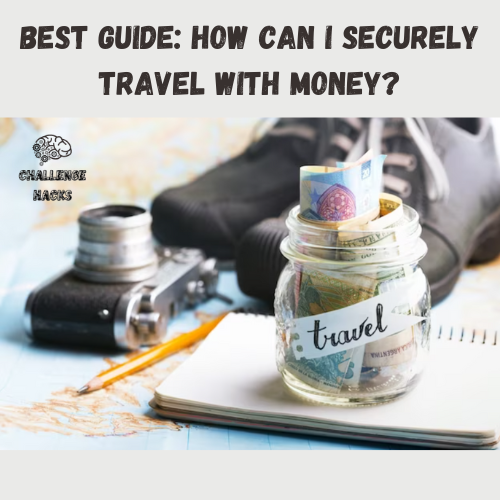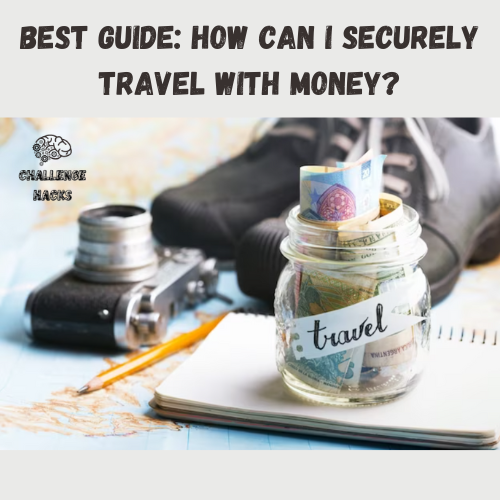
It can be difficult to travel with money, particularly if you are visiting a foreign nation or an area where you are unfamiliar with the local currency, banking system, or level of security. It’s important to have just enough money to pay for necessities, but not so much that you run the danger of losing it or drawing unwelcome attention.
You should also ensure access to alternative payment methods like credit cards, debit cards, or mobile wallets. However, it’s advisable not to solely rely on them in case of loss, theft, or blockage. So how can you securely travel with money and stay clear of typical traps and frauds? You can abide by the following best practices and advice.
Pros and Cons of Different Forms of Money
Venturing on a journey? Diversify your payment methods for goods and services. Each form of currency carries its own set of advantages and drawbacks, contingent upon your surroundings and destination. Delve into this comprehensive table, breaking down the pros and cons of various monetary options. 🌍💳💼
| Form of Money | Pros | Cons |
|---|---|---|
| Cash | – Widely accepted | – Risk of loss or theft |
| – Easy exchange and use | – Risk of counterfeit or damaged bills | |
| – No fees or charges | – Need to carry large amounts for big purchases | |
| – Negotiation flexibility | – Need to exchange at unfavorable rates or fees | |
| – Easy tipping and donations | – Need to keep track of different currencies | |
| Credit Card | – Convenient and secure | – Not universally accepted |
| – Rewards or cashback potential | – May incur foreign transaction fees or interest | |
| – Fraudulent charge dispute capability | – Risk of being blocked or declined by the bank | |
| – Travel insurance and perks | – Risk of being skimmed or cloned by criminals | |
| – Contactless and mobile payment options | – May require carrying a backup card or remembering PIN | |
| Debit Card | – Similar to credit card benefits, minus interest | – ATM fees or withdrawal limits |
| – Cash withdrawal from ATMs | – Potentially lower fraud protection than credit card | |
| – Links to mobile wallets or apps | – Notification to the bank may be required before travel | |
| – Use of prepaid or travel cards | ||
| Traveler’s Check | – Similar to credit card, minus rewards | – Limited acceptance |
| – May incur ATM fees or withdrawal limits | – Fees or commissions may apply | |
| – Potentially lower fraud protection than credit card | – ID or signature may be required | |
| – Notification to the bank may be required before travel | – Finding a reliable issuer or agent may be necessary | |
| Mobile Wallet | – Fast and convenient | – Not universally accepted |
| – Storage of multiple cards or currencies | – Dependency on internet or phone battery | |
| – Use of QR codes or NFC technology | – Potential fees or charges | |
| – Peer-to-peer transfers and app functionality | – Security or privacy concerns may arise |
Discover insightful information by using this unique table, which walks you through the benefits and drawbacks of various payment options. Make selections based on your needs and tastes by carefully weighing the advantages and disadvantages of each option in a thorough comparison. 💡💸
As you can see, there is no one-size-fits-all method for using cash when traveling. You must weigh the pros and disadvantages of each payment method, taking into account aspects like cost, convenience, security, and availability before selecting the one that best suits your requirements. Diversifying your sources of income and keeping a fallback plan in place are smart financial practices.
How to Prepare Your Money Before You Travel
Make sure you have enough money, in the appropriate currency for your trip, (Securely Travel with Money) before you embark on your adventure by doing some research and making a plan. Here are some actions you may take to prepare your finances before you leave on your trip.

- Check the exchange rate and the cost of living of the country or region that you are visiting. You can use online tools or apps to get the latest information and compare prices. This will help you estimate how much money you need and how much you can spend.
- Exchange some cash in advance at your local bank or a reputable currency exchange service. You can also order some foreign currency online and have it delivered to your home or office. This will save you time and hassle when you arrive at your destination, and give you some cash for emergencies or small purchases.
- Notify your bank and credit card company that you are traveling and where you are going. This will prevent them from blocking or declining your transactions due to suspicious activity. You can also ask them about their fees, charges, and policies for using your cards abroad, and request a higher credit limit or withdrawal limit if needed.
- Make copies or scans of your cards and documents such as your passport, driver’s license, and travel itinerary. You can also write down the contact numbers and email addresses of your bank and credit card company, and the emergency numbers of the local police and embassy. Keep these copies or scans safe, such as your email, cloud storage, or a trusted friend or family member. This will help you in case you lose or damage your cards or documents, or need to report a theft or fraud.
How to Carry Your Money While You Travel
It’s important to travel with caution and financial intelligence. You wish to stay away from losing your money and being a victim of con artists or robbers. Here are a few pointers and recommended procedures for carrying cash on your travels.
Put your cash, credit cards, and documents in a neck wallet or money belt. Wearing these covert and safe pouches beneath your garments will allow you to quickly access them when needed. A zippered compartment or a secret pocket in your clothes or baggage are other options. Since they are simple to pickpocket or steal, avoid carrying a standard wallet, pocketbook, or backpack. (Securely Travel with Money)
Organize your cash into several locations, including your bags, your travel companion, your hotel safe, or your money belt. If one of them is lost or stolen, you won’t lose all of your money this way. It is also possible to utilize separate cards or accounts for distinct uses, for example, one for online shopping, one for emergencies, and one for ATM withdrawals.
Only bring as much cash as you’ll need for the activity or the day. You can retain some cash on hand for minor, infrequent expenses like tips, taxi fares, or street sellers, and use your cards or mobile wallets for larger, more frequent payments. Additionally, using local currency rather than international will get you better rates and keep you safe from scams and confusion.
Be aware of your surroundings and your belongings when you are in public places, such as airports, train stations, markets, or tourist attractions. You can use a lock, a cable, or a strap to secure your luggage or backpack and keep your money belt or neck wallet close to your body. You can also avoid flashing your cash or cards, and check your receipts and change carefully.
How to Spend Your Money Wisely and Safely
Making the most of your money and having a great time are your two main goals when you travel. You don’t want to waste, overspend, or lose money as a result of bad choices or con artists. Here are some guidelines and best practices to help you manage your finances sensibly and securely travel with Money.

- Create a budget and monitor your spending both before and during your trip. Utilize online tools or apps to establish daily or weekly limits, keeping track of your income and expenditures. This practice aids in managing expenses and saving for specific goals or priorities.
- Opt for cards or mobile wallets for most transactions due to their convenience and enhanced security compared to cash. Take advantage of features like rewards, cashback, insurance, and dispute resolution provided by these payment methods. Additionally, consider using contactless or mobile payments to minimize physical contact with cash or cards.
- When using ATMs or currency exchange services, choose reliable and reputable options affiliated with your bank, card network, or well-known companies. Online tools or apps can assist in locating the nearest and best-suited options while avoiding services in isolated or questionable areas, or those showing signs of tampering or skimming.
- Stay vigilant against common travel scams and frauds, such as inflated bills, rigged meters, counterfeit goods, or unsolicited offers. Refrain from paying or accepting money in advance and avoid sharing personal or financial information with strangers or unverified sources.
Conclusion
While using money to travel can present some difficulties, it can also lead to lucrative and delightful experiences. You can safely travel with money and stay away from frequent hazards and scams by using the advice and best practices we’ve provided in this post. Additionally, you can travel with less money and manage your finances sensibly and safely. We sincerely hope that this post has aided you in planning your finances ahead of time, carrying cash while traveling and exchanging cash while on the road. We hope you have a joyful and Securely Travel with Money! 😊
- Traveling with money requires research, planning, and diversification of your money sources and forms.
- Each form of money has pros and cons, depending on the situation and the destination. It would be best if you considered the factors such as the availability, cost, security, and convenience of each option, and choose the best one for your needs and preferences.
- Before you travel, you need to check the exchange rate and the cost of living, exchange some cash in advance, notify your bank and credit card company, and make copies or scans of your cards and documents.
- While you travel, you need to use a money belt or a neck wallet, split your money into different places, carry only the amount of cash that you need, and Pay attention to your surroundings and your possessions.
- When you travel, you need to use your cards or mobile wallets for most of your payments, use ATMs or currency exchange services that are reliable and reputable, compare the exchange rates and fees, and beware of common scams and frauds.
- You can also save money when you travel by planning and booking in advance, traveling light and packing smart, eating local and shopping smart, and using public or shared transportation.
Y0U MAY LIKE THIS 5 Tech Hacks to Make Less Stress When Travel
How much cash should I carry when I travel?
Since it varies on your destination, finances, preferences, and circumstances, there is no one correct answer to this issue. But as a general rule of thumb, you should always have enough cash on hand to pay for necessities and unexpected expenses like food, lodging, transportation, and medical attention. Additionally, you can bring additional cash for donations, tips, or mementos. Carrying between 10% and 20% of your entire budget in cash and utilizing credit cards or mobile wallets for the remaining amount is a reasonable estimate.
What is the best way to exchange money when I travel?
The optimal method for exchanging money while traveling depends on various factors. Consider the following options:
Local Banks: Exchange currency at local banks for competitive rates and reliable service.
ATMs: Withdraw local currency from ATMs for convenience, but be mindful of associated fees.
Credit Cards: Use credit cards for purchases as they often offer favorable exchange rates. Ensure your card is widely accepted at your destination.
Online Currency Exchanges: Utilize reputable online platforms for currency exchange, comparing rates and fees.
Currency Exchange Counters: Choose reputable counters at airports, hotels, or currency exchange offices for quick access, but be cautious of fees.
Traveler’s Checks: Consider traveler’s checks for added security, though they are less common nowadays.
Before traveling, research the currency exchange options available at your destination and evaluate the associated costs to determine the best approach for your specific needs.
How can I Securely travel with Money?
Securely Travel with Money by using anti-theft wallets, dividing your funds, avoiding flashy displays, notifying your bank of travel plans, using hotel safes, keeping an emergency cash stash, staying vigilant against pickpockets, considering digital payment methods, backing up important documents, and choosing secure accommodations.
